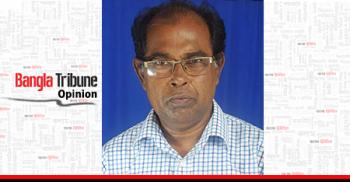 After 23 June 1757 which fastened the people of this sub-continent with the shackle of two hundred years of servitude and misrule, which finally ended on 14 August 1947. It came as an embodiment of hopes and aspiration for erstwhile East Pakistani Muslims. Much later, 21 February 1952, was another epoch-making day. It is a red letter.
After 23 June 1757 which fastened the people of this sub-continent with the shackle of two hundred years of servitude and misrule, which finally ended on 14 August 1947. It came as an embodiment of hopes and aspiration for erstwhile East Pakistani Muslims. Much later, 21 February 1952, was another epoch-making day. It is a red letter.
The background and ramification of the day of our language movement need special mention from an analytical perspective because it is a symbol of our national entity.
Hardly a year had passed since 1947 when West Pakistan rulers started hatching their heinous conspiracy against the naive East Pakistanis. The focus of their conspiracy was the language of these people. Despite the fact that Bengali was the language of 56.40 percent people, whereas Urdu was spoken by only 3.27 percent countrymen. Erstwhile Governor General Quaid E Azam Muhammad Ali Jinnah in his speech of 21 March (1948) in Dhaka Race Course Maidan declared that Urdu alone should be the state language of Pakistan. His speech in the convocation ceremony of Dhaka University held in Curzon Hall on 24th March (1948) echoed the same stance. Then and there the students protested strongly. Following the death of Jinnah, Liakot Ali Khan visited Dhaka where in his address at a public meeting, he unequivocally voiced his resolution not to make Bangla the state language. As the brief Liakot Ali Khan’s reign expired, he was shot dead in broad light at Rawalpindi while delivering a speech. The opportunist that succeeded him was no other than an East Pakistan born politician named Khaza Nazimuddin who immediately before Jinnah’s visit to Dhaka falsely assured the agitators of language of fulfilling their demand in a bid to end the language movement. But as the chief of the state, he rejected outright the East Pakistani’s proposal to make Bangla the state language. Thus, he proved himself to be a thoroughly unreliable politician.
Hopes of the people were belied many times before 20 February 1952 on the language issue before the Rastrabhasa Sangram Parishad as constituted by the intrepid lovers of the Bangla language. In the meeting of the parishad, the decision to observe a countrywide hartal to press home their demand was unanimously accepted. It is noteworthy that this day Bangabandhu Sheikh Mujibur Rahman, as well as Mohiuddin Ahmed, were transferred from Dhaka Jail to Faridpur jail where the duo started an indefinite hunger strike for the official recognition of their mother tongue. On the other hand, the West Pakistani predators imposed section 144 to ban all gatherings.
As the situation went haywire, the leafy shade of a mango tree (Amtala) of Dhaka University turned into a meeting point for the students. Leaders such as Abdul Matin, Oli Ahmed, Kazi Golam Muhammad and others from the student community inspired the agitators to flout section 144. There were bold, loud slogans. Leading the students was an incredibly bold student leader Habibur Rahman Shelly who urged the students to ignore the situation 144, Chasing and counter-chasing, picketing etc. were the initial occurrences involving the police and the students. As the situation worsened, at 3pm the police opened fire. Rafique, Barkat, Jabbar, Salam were all shot and this led to their martyrdom. Sixty students were injured while rickshaw-puller Awal and service-holder Safikur Rahman were also killed. A fervent request to see the casualties was made to so-called Chief Minister Nurul Amin who was much like Khaja Nazimuddin but it fell on deaf ears. A pall of gloom pervaded the whole of Dhaka. Instead of handing over the dead bodies of the martyrs to their dear ones, the police like the mercenaries of the rulers entombed them in Azimpur Graveyard at the night of 21st February. Not only students but people from other walks of life attended their funeral prayer in thousands. Totally embarrassed, the autocrats yielded to the movement for the Bangla language and announced it as the state language.
Hence, there’s no room for denial that this 21st February is a unique day in our history, ennobled by the sacrifice of our youth. It has brought the nation an imperishable glory that has impressed the whole world. The aforementioned warriors sacrificed their lives to save the prestige and dignity of the mother language. Their death has transported them to a blissful place of the eternal world. We shall never find them again in this life, but there will always be a special place in our hearts for them. If we consider the matter connotatively, we cannot but emphasise the immortality of the dead. Their disappearance is merely physical or external. Spiritually, they are ever alive, for the ever-memorable 21 February was made memorable for their self-sacrifice. This day saw an unforgettable history of unflinching courage, exemplary patriotism, all-conquering love for mother or mother language, and unswerving protestation against the injustice of the predators. This day will indoctrinate generation after future generation with the spirit of nobility. It will be an eternal source of inspiration for the protestors who are a victim of discriminatory treatment of their oppressors as the universally irrefutable message goes that the truth is always victorious in its war against untruth. Many think that the seed of the hard-earned liberation of the nation was sown on this 21 February to be fully expanded in 1971. So to say, the 21 February is the mother of the Bengalees and no wonder it is celebrated with such fervour annually. But celebrations are nothing but ostentation that should resonate with our inner lives. Therefore, our countrymen must revive the spirit of this 21st February in their thoughts as well as action. What matters the most is that this day has been declared as the international mother language day by the UNESCO, which is the best possible international recognition for Feb 21, 1952.
Emdadul Haque is a lecturer of English at the Moheshpur Government College in Jhenidah.


